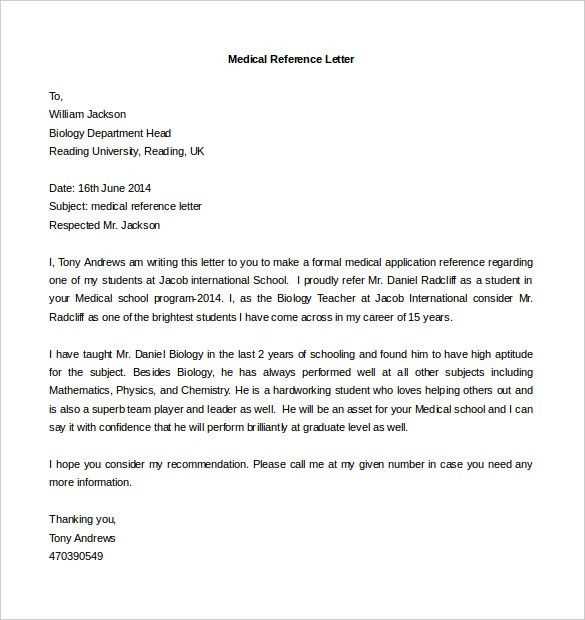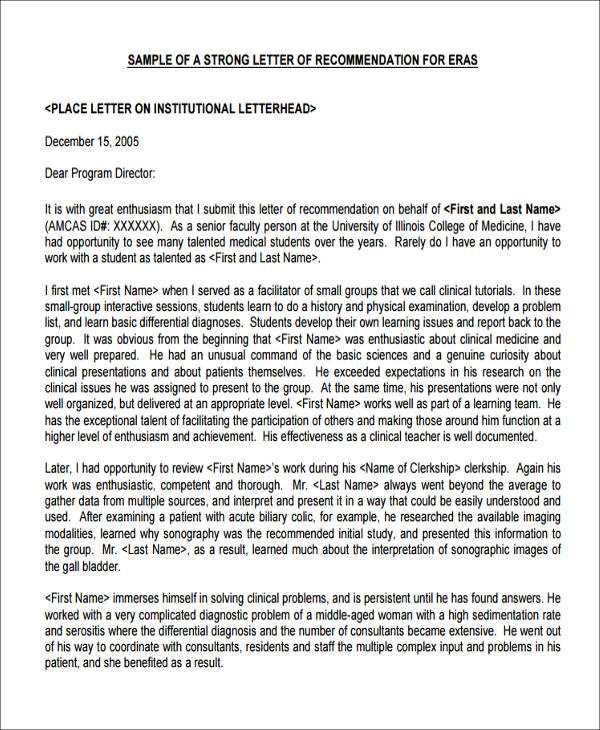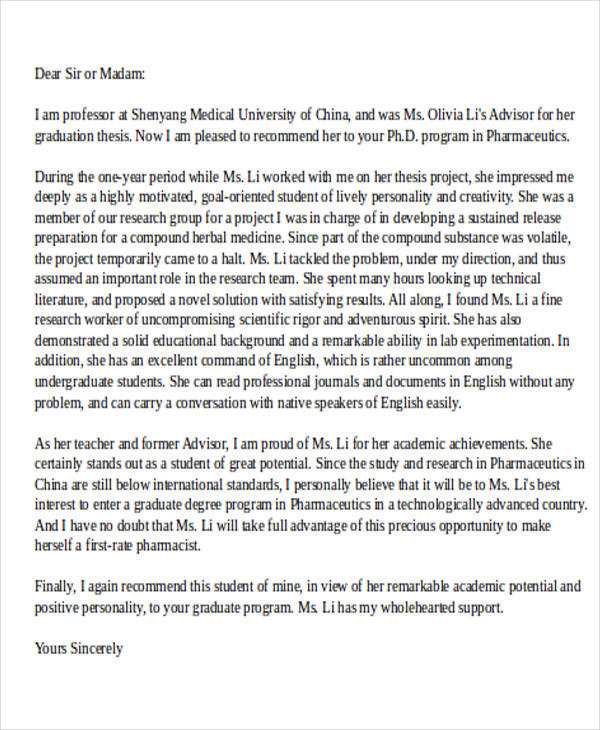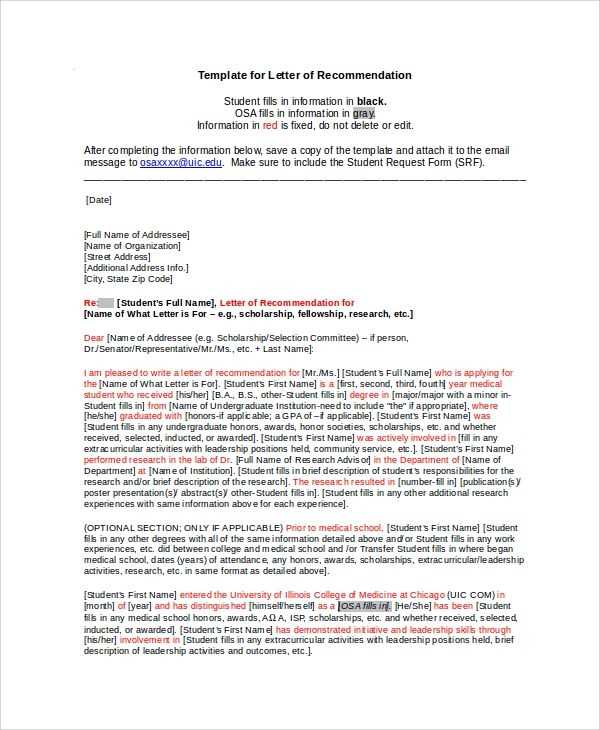Medical School Letter of Recommendation Template

When applying to a professional program, one of the most influential components of the process is the support from trusted mentors or colleagues. Crafting a powerful endorsement that showcases an individual’s strengths, character, and potential is key to making a lasting impression on the selection committee.
Effective letters go beyond simply listing achievements. They weave together personal anecdotes and specific examples that highlight the applicant’s abilities and qualities. Such endorsements provide a deeper understanding of how the individual stands out in a competitive field.
Crafting a Strong Medical Program Endorsement

Creating a compelling endorsement that stands out in a competitive selection process requires a combination of structure, content, and personal insight. A well-written message should not only present the applicant’s achievements but also provide a clear picture of their potential, character, and readiness for the challenges ahead.
Key Features of a Powerful Endorsement
A strong letter emphasizes the applicant’s unique qualities, including their ability to succeed in a demanding environment, dedication to the field, and their potential for growth. It should highlight specific examples of how the individual has excelled in relevant areas, such as leadership, teamwork, and problem-solving.
Structuring the Endorsement Effectively
The structure of an endorsement should follow a logical flow, starting with an introduction that establishes the writer’s relationship with the applicant. The body of the endorsement should provide detailed examples of the applicant’s achievements and qualities, while the conclusion should reinforce their suitability for the program.
| Section | Key Points |
|---|---|
| Introduction | Establish relationship with the applicant, explain context. |
| Body | Provide concrete examples of accomplishments and qualities. |
| Conclusion | Summarize why the applicant is an ideal fit for the program. |
Key Elements of a Recommendation
Creating a well-rounded endorsement involves more than simply listing achievements. A strong message effectively highlights the candidate’s abilities, character, and readiness to excel in a challenging environment. It should focus on relevant experiences that showcase their unique qualities and potential for success.
Personal Connection and Credibility
One of the most important elements is establishing the writer’s relationship with the candidate. The connection should be clearly stated to provide context for the endorsement. The more direct and meaningful the relationship, the more credible and valuable the support will be.
Specific Examples of Achievements
Rather than general statements, the endorsement should include specific examples that highlight the candidate’s accomplishments, leadership abilities, and other qualities. These examples make the message more compelling and give the selection committee a clear understanding of the candidate’s strengths. Concrete details help paint a vivid picture of the applicant’s qualifications.
How to Highlight Student Achievements
When crafting a compelling endorsement, it is crucial to present the student’s accomplishments in a way that emphasizes their strengths and potential. Rather than merely listing their successes, a well-crafted message should demonstrate how these achievements reflect the student’s skills, character, and readiness for future challenges.
- Focus on Impactful Experiences: Highlight key moments where the student has made a tangible difference in their field or community.
- Use Concrete Data: Incorporate measurable achievements, such as grades, awards, or project outcomes, to make their successes more tangible.
- Show Consistency: Mention how the student consistently performs well under pressure or over extended periods of time.
By emphasizing these points, the endorsement will provide a clear and convincing picture of the student’s capabilities, setting them apart from others in the selection process.
Effective Language and Tone for Letters
The language and tone used in an endorsement can significantly impact its effectiveness. A strong, persuasive message should strike a balance between professionalism and warmth, demonstrating both the applicant’s abilities and the writer’s genuine support.
Choosing the Right Tone
The tone of the message should be positive and confident, but also sincere. Avoid overly casual or exaggerated language, as it can undermine the message’s credibility. A tone that is both respectful and enthusiastic will help convey the applicant’s worth while maintaining professionalism.
Using Clear and Precise Language

Clarity is essential when presenting key points. The language should be straightforward and avoid ambiguity. Use concise wording to clearly outline the candidate’s strengths, providing specific examples that demonstrate their abilities without over-complicating the message.
Tailoring the Letter for Medical Programs
When crafting an endorsement for a competitive program, it is important to tailor the message to align with the specific values and expectations of that field. Highlighting relevant skills and experiences that directly relate to the program can greatly enhance the strength of the endorsement.
Aligning with Program Values
Each program has its own unique set of priorities. By focusing on the candidate’s abilities that resonate with these values–such as critical thinking, compassion, and dedication to the field–the endorsement becomes more relevant and impactful.
Addressing Key Skills and Experiences

It’s essential to emphasize experiences that directly relate to the demands of the program. Whether it’s a particular research project, clinical exposure, or leadership role, showcasing how these skills have prepared the candidate for the specific challenges ahead makes the message stronger. Tailoring examples to the program’s requirements will demonstrate the applicant’s readiness and passion for the field.
Common Mistakes to Avoid in Recommendations
When writing a strong endorsement, it’s essential to avoid common pitfalls that could weaken the impact of the message. Recognizing these errors ensures that the final text is effective, professional, and truly highlights the candidate’s strengths.
Lack of Specificity
One of the most common mistakes is using vague or generalized statements. Phrases like “very good student” or “hard worker” do not provide enough insight into the applicant’s abilities. Specific examples that showcase achievements or personal traits will make the endorsement more convincing and relatable.
Overly General Praise
Another mistake is offering excessive praise without supporting evidence. While it’s important to be positive, the endorsement should focus on qualities and accomplishments that can be substantiated with examples. Overly broad praise, such as “best student ever,” can come across as insincere or unhelpful.
Tips for a Convincing and Impactful Letter
To make an endorsement stand out, it is crucial to focus on delivering a strong, persuasive message that reflects the applicant’s true potential. A compelling and impactful message not only highlights the student’s strengths but also effectively communicates their ability to succeed in future challenges.
Be Specific and Detailed
To create a convincing message, always use specific examples and details that demonstrate the candidate’s unique qualities. Mentioning particular projects, challenges overcome, or leadership roles will give depth to the endorsement and provide a clear picture of the applicant’s capabilities.
Maintain a Positive but Balanced Tone
While it’s essential to be enthusiastic and supportive, avoid exaggerating the candidate’s achievements. A balanced tone that acknowledges their strengths without being overly flattering will make the endorsement feel more authentic and credible. Focus on qualities that directly relate to the program’s demands, ensuring that your words leave a lasting impression.